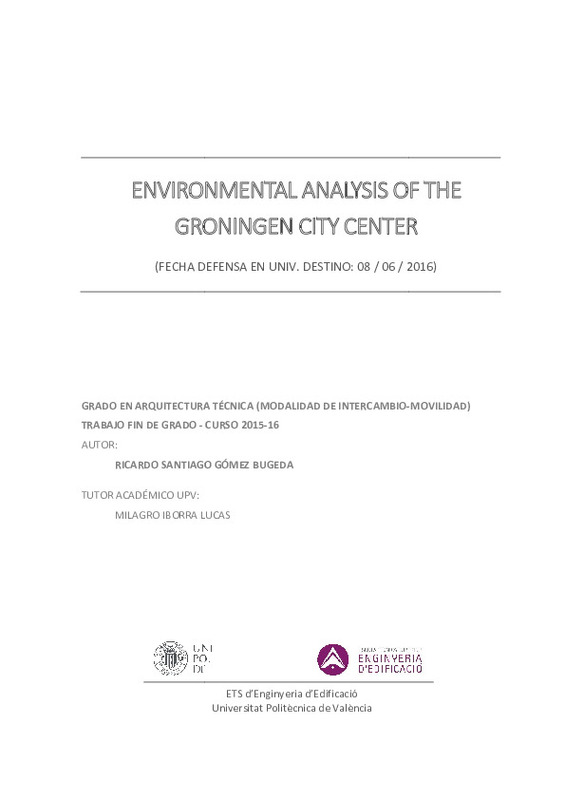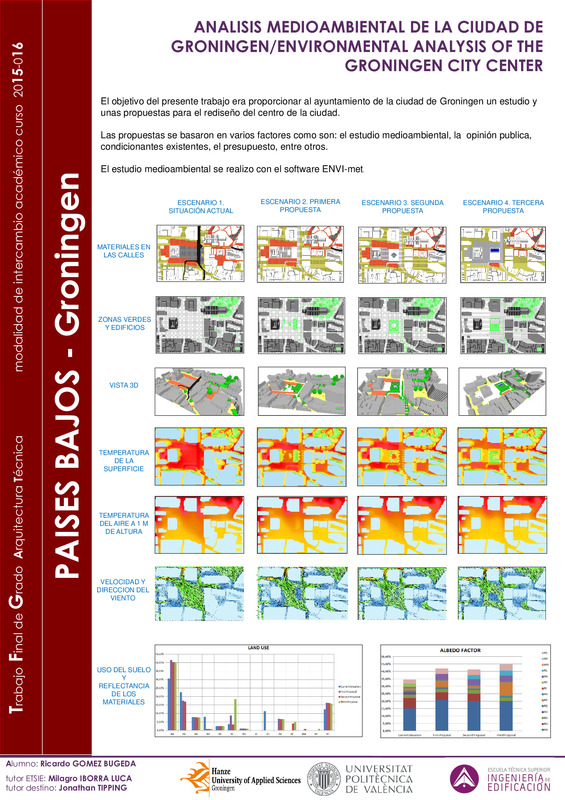JavaScript is disabled for your browser. Some features of this site may not work without it.
Buscar en RiuNet
Listar
Mi cuenta
Estadísticas
Ayuda RiuNet
Admin. UPV
Environmental Analysis of the Groningen City Center
Mostrar el registro sencillo del ítem
Ficheros en el ítem
| dc.contributor.advisor | Iborra Lucas, Milagro
|
es_ES |
| dc.contributor.author | Gómez Bugeda, Ricardo Santiago
|
es_ES |
| dc.coverage.spatial | east=6.5677031; north=53.2186875; name=Informatiecentrum Groningen Vernieuwt, Grote Markt 29, 9711 LW Groningen, Països Baixos | |
| dc.date.accessioned | 2017-02-16T16:45:30Z | |
| dc.date.available | 2017-02-16T16:45:30Z | |
| dc.date.created | 2016-07-26 | |
| dc.date.issued | 2017-02-16 | es_ES |
| dc.identifier.uri | http://hdl.handle.net/10251/77967 | |
| dc.description.abstract | This final thesis project is part of the research that is carrying out by the Gemeente Groningen in order to make the city center more sustainable and livable. The municipality of Groningen has recently published a conceptual development plan for improving the inner-city of Groningen, this report is called Bestemming Binnenstad 01/2016 . The main focus of this report is convert the city center to an environmental friendly downtown, reducing pollution, reroute public and private transport, give possible green blue solutions (both design and construction details) to make colder the city center in order to face what will lie ahead in the future in terms of climate change. The report lacks details on how the municipality will include the green and blue (water) improvements in the city. This is where this final thesis project will concentrate. The focus of the project is to look at the feasibility of including climate resilient options into the current plan. There are many constraints to implement green-blue solutions in the inner city. The main ones being lack of space and money. The research will investigate these issues, along with other factors. The research will be focus on one of the hotter areas of Groningen (Grote Markt), giving three different green-blue solutions for the area. This three solutions will be analysis by different factors, including budget, maintenance, public opinion and 3D model. The 3D model will be done with AutoCaD, Revit and EnviMet. EnviMet is a software that create a three dimensional microclimate model designed to simulate the surface plant air interactions in urban environment. With a multi-criterial analysis including all the factors named will be choose the most successful option. | es_ES |
| dc.description.abstract | Este trabajo final de grado forma parte de un estudio llevado a cabo por el Ayuntamiento de Groningen con el fin de hacer la ciudad más sostenible. El ayuntamiento de Groningen ha publicado recientemente un plan de desarrollo para mejorar el centro de Groningen, este informe se llama" Bestemming Binnenstad 01/2016 . El principal objetivo de este plan es convertir el centro de Groningen en una zona agradable, sin polución, redefinir transporte público y privado y dar posibles soluciones de construcciones ecológicas (green-blue solutions), con el fin de bajar las temperaturas para hacer frente al cambio climático. Este trabajo de fin de grado se centrará en las posibles soluciones de construcciones Green-blue Existen muchas limitaciones para realizar soluciones Green-blue en el interior de la ciudad, entre ellas la falta de espacio y dinero. El trabajo se centrará en estas cuestiones junto con otros factores. El centro de Groningen abarca mucho espacio, por lo que nuestro estudio se centrará en una de las zonas más cálidas (Grote Markt), una de las plazas principales de Groningen, dando a este espacio tres diferentes soluciones. Estas tres soluciones serán analizadas por diferentes factores, incluyendo presupuesto, mantenimiento, opinión pública y 3D. El modelo 3D se hará con AutocaD , Revit y ENVImet. ENVI-met es un programa que permite el diseño de un modelo climático en tres dimensiones para simular las interacciones entre superficie-planta-aire en el ambiente urbano. El programa trabaja basado en las leyes fundamentales de dinámica de fluidos y termodinámica. Finalmente con un análisis multi-criterio incluiremos todos los factores nombrados para seleccionar la solución más acertada. | es_ES |
| dc.format.extent | 78 | es_ES |
| dc.language | Inglés | es_ES |
| dc.publisher | Universitat Politècnica de València | es_ES |
| dc.rights | Reserva de todos los derechos | es_ES |
| dc.subject | Sustainable architecture | es_ES |
| dc.subject | Environmental protection | es_ES |
| dc.subject | Urban cores | es_ES |
| dc.subject | Arquitectura sostenible | es_ES |
| dc.subject | Construcción bioclimática | es_ES |
| dc.subject | Protección medioambiental | es_ES |
| dc.subject | Centros urbanos | es_ES |
| dc.subject.classification | CONSTRUCCIONES ARQUITECTONICAS | es_ES |
| dc.subject.other | Grado en Arquitectura Técnica-Grau en Arquitectura Tècnica | es_ES |
| dc.title | Environmental Analysis of the Groningen City Center | es_ES |
| dc.title.alternative | Análisis medioambiental del casco urbano de Groningen | |
| dc.type | Proyecto/Trabajo fin de carrera/grado | es_ES |
| dc.rights.accessRights | Abierto | es_ES |
| dc.contributor.affiliation | Universitat Politècnica de València. Departamento de Construcciones Arquitectónicas - Departament de Construccions Arquitectòniques | es_ES |
| dc.contributor.affiliation | Universitat Politècnica de València. Escuela Técnica Superior de Gestión en la Edificación - Escola Tècnica Superior de Gestió en l'Edificació | es_ES |
| dc.description.bibliographicCitation | Gómez Bugeda, RS. (2016). Análisis medioambiental del casco urbano de Groningen. http://hdl.handle.net/10251/77967. | es_ES |
| dc.description.accrualMethod | TFGM | es_ES |
| dc.relation.pasarela | TFGM\50412 | es_ES |
Este ítem aparece en la(s) siguiente(s) colección(ones)
-
ETSIE - Trabajos académicos [2383]
Escuela Técnica Superior de Ingenieria de Edificación







